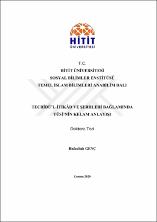Tecrîdü'l-itikâd ve şerhleri bağlamında Tûsî'nin kelam anlayışı
Citation
Genç, H. (2020). Tecrîdü'l-itikâd ve şerhleri bağlamında Tûsî' nin kelam anlayışı (Doktora Tezi).Abstract
Nasîruddîn Tûsî'nin bir dönem ilim dünyasına damga vuran kelam eseri Tecrîdü'l-itikâd ve şerhleri üzerinde çalışılmayı hak eden eserlerdir. Bu çalışmada Tecrîdü'l-itikâd ve şerhleri özelinde Tûsî'nin usûl-i selâseye dair görüşleri konu edinilmiştir. Çalışmada Tûsî'nin kelami görüşlerin konu edinilmesinin nedeni İmâmiyye Şia'sına mensup olan Tûsî'nin günümüz ilim dünyasında bir ön kabul halini alan Şii kelamının imamet konusundaki görüşleri hariç Mutezile kelamından iktibas olduğu kanaatini yansıtıp yansıtmadığını ve Sünni kelamının Şii kelamı üzerinde etkisinin varlığını araştırmaktır. Tezimiz, öncelikle Tecrîdü'l-itikâd'a dair ülkemizde yapılan ve nicel açıdan yetersiz olan çalışmalara eklenerek lieratürdeki bir boşluğu doldurmaktadır. Yine yapılan çalışmalar Tecrîdü'l-itikâd'ın belirli bir kısmını kapsamaktadır. Çalışmamızda yer alan meselelerin büyük bir kısmı daha önce Tecrîdü'l-itikâd özelinde çalışılmamıştır. İkinci olarak da geçmişte ve günümüzde çatışmayla anılan Sünni-Şii ilişkilerinin klasik dönem ilim dünyasındaki yansımalarını görmek Sünni-Şii ilişkisine farklı bir boyut kazandırmak açısından önemli bir çalışma olmuştur. Tezimizde Tecrîdü'l-itikâd ve diğer eserlerinden Tûsî'nin söylemleri araştırıldıktan sonra Tecrîdü'l-itikâd'ın şerhleri kronolojik olarak mukayeseli şekilde tetkik edilerek Tûsî'nin söylemlerine dair bir çıkarım yapılmıştır. Ortaya çıkan sonuç Mutezile ve Ehl-i Sünnet ekollerinin görüşleriyle karşılaştırılarak Şia'nın iligili meselede otantik bir görüşünün olduğu veya diğer ekollerden birinin görüşünü aldığının tespiti yapılmaya çalışılmıştır. Çalışmanın ana kaynaklarını Tecrîdü'l-itikâd ve isimleri giriş bölümünde zikredilen şerhler oluşturmaktadır. Sünni kelamının Şia üzerindeki etkisini araştırmak için bu eser ve şerhlerinin seçilme nedenleri Tûsîs'nin Şii olması, Tûsî'nin kelami görüşlerini tam olarak anlatan tek eserinin Tecrîdü'l-itikâd olması ve Sünni dünyada bu eserin rağbet görmesinin sebebinin bize göre Sünni kelamından etkilenmiş olmasıdır. The words of Nasîr al-dîn Tûsî, which marked the scientific world for a while, deserved to be studied on Tajrid al-i'tikâd and interpretations. In this study, the views of Tûsî about the method of usrl al-salat with regard to Tajrid al-i'tikâd and annotations are discussed. In the study, the reason for the subject of the words of Tûsî's theories is to investigate whether Tûsî, who belongs to the Imamia Shia, reflects the opinion that the Shiite word, which has become a preliminary acceptance in today's world of science, exists from the Mutezila word and the effect of the Sunni word on the Shiite word. Our thesis firstly fills a gap in the literature by adding to the studies on Tajrid al-i'tikâd in our country which is quantitatively insufficient. Again, the studies cover a certain part of Tajrid al-i'tikâd. Most of the issues in our study have not been previously studied in the context of Tajrid al-i'tikâd. Secondly, seeing the reflections of the Sunni-Shia relations, which are known as conflict in the past and today, in the classical period of the world of science, has been an important study in terms of adding a different dimension to the Sunni-Shia relationship. In our thesis, after investigating the discourses of Tûsî from Tajrid al-i'tikâd and other works, a conclusion was made chronologically comparatively and an inference about the discourses of Tûsî. By comparing the resulting result with the views of Mutezila and Ahl al-Sunnah schools, it was tried to be determined that the Shia had an authentic view of the issue or received the opinion of one of the other schools. The main sources of the study are the annotations and their commentaries, whose names are mentioned in the introduction. In order to investigate the effect of Sunni theology on the Shia, the reasons for choosing these works and commentaries are the fact that Tûsî's Shia is Shia, the only work of Tûsî that expresses his views, and the reason why this work is sought after in the Sunni world is influenced by the Sunni theology.


















